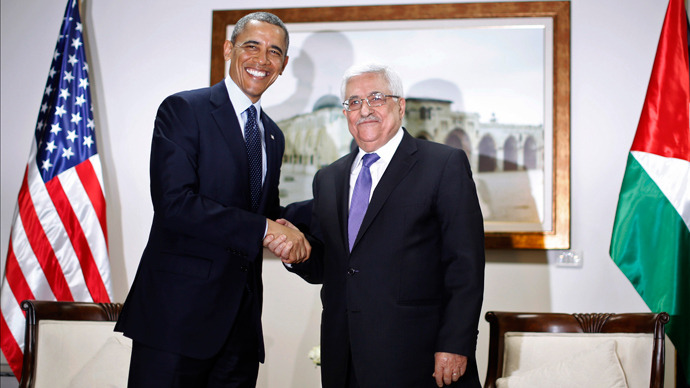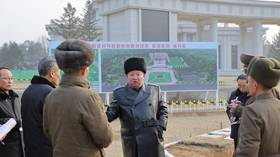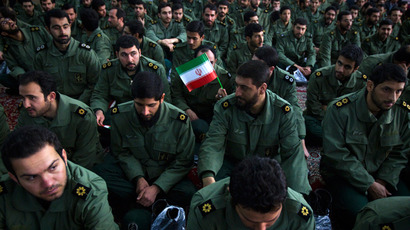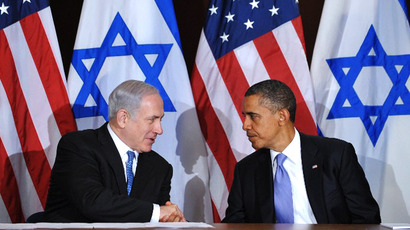Palestinians deserve sovereign state, end to Israeli occupation - Obama

American President Barack Obama confirms the US is committed to creating two independent states, Israel and Palestine, whatever time it takes to reach the goal. Obama stressed direct talks between Palestinians and Israelis is the only way to do so.
Obama spoke at a news conference in the West Bank with Palestinian Authority President Mahmoud Abbas.
He confirmed the US is committed to creating two independent states, Israel and Palestine, however long it takes. Obama stressed direct talks between Palestinians and Israelis is the only way to reach the goal.
He says Palestinians should not have to confront the daily indignities that come with occupation.
Obama says the US needs a “viable and contiguous” Palestinian state co-existing alongside the state of Israel.
The US president condemned construction of new Israeli settlements on Palestinian territories.
"I told Mr. Netanyahu that it has been US policy not to consider settlement activity to be constructive, appropriate or advance the cause of peace,” criticized Obama.
Still, Obama acknowledged that Israeli politics is a complicated matter and that the issue of settlements cannot be “resolved overnight”.
"I want both sides [Israel and Palestine] to be doing what they can to build a sense of trust, and I hope that the US government will be helpful in that," Obama said.
"My argument is: even though both sides may have areas of
strong disagreement, may be engaging in activities that the other
side thinks is a breach of good faith, we have to push through
those things to try to get an agreement," Obama said.

Palestinian Authority President Mahmoud Abbas added that "We never gave up our vision that settlement activity is illegal, that the Israeli government understands this. We hope they listen. We spoke about this with the president and we clarified this."
Abbas recalled that Israeli settlements are considered illegal also by the United Nations, which so far has issued “13 resolutions, not only condemning settlements, but demanding ending and removing them because they’re illegal.”
"We’re demanding nothing other than the implementation of international law," Abbas said, pointing out that the question of settlements is one of the biggest obstacles towards realization of a two-state solution.
Abbas said that the Palestinians recognize the state of Israel."We continue to recognize Israel according to the Road Map and the Arab Initiative,” he said.
Palestinian leader said he told President Obama that peace between the Palestinians and Israel cannot be achieved through violence, occupation, settlements, arrests or denial of refugee rights.
Abbas also talked about a distant prospect, saying that if a Palestinian state were created, the Arab nations would definitely recognize the state of Israel.
"If peace came between us and the Israelis, Israel knows well that all the Arab and Islamic countries, 57 states, will recognize the state of Israel immediately," Abbas said.
Despite the fact that the negotiation process between Israel and Palestine is stalled, no hope is lost and negotiation will continue.
“I absolutely believe that it is still possible, but I think it is very difficult,” Obama said.
‘We don’t welcome Obama in Palestine’
Palestinians have been left disillusioned by the visit of the
American president, saying that Obama delicately avoided the
gravest obstacles to peace in the region.
Derek Graham, an activist in Gaza, says Obama has always sided with Israel and the new visit shows nothing has actually changed, since Obama confirmed that he is Israel’s best ally and that he will do anything possible to help the Israeli situation.
“[Obama’s visit] was a PR stunt. He hasn’t actually done anything in regards to the Palestinian-Israeli issue. He may have talked with Netanyahu in regards to Iran and that would be a different subject. I think that’s where the main stumbling block is between Israel and the US at the moment. In regards to Palestine there was no further movement,” Derek Graham told RT.
“The main obstacle has always been [Israeli] settlements,” Graham shared. “Obama himself has actually called for freeze of settlements – and the Israelis just ignore what he says and continue with what they are doing.”
RT's Paula Slier talked to a number of Palestinians on the West Bank protesting against the visit of American president and they agree there is not much they can expect from Barack Obama.
“We don’t welcome Obama in Palestine. He is a partner in killing us, Palestinians. There are prisoners who are on a hunger strike in Israeli prisons – and he does not care about them or this nation,” a Palestinian told RT.
“The US is standing against any attempts to move the peace process forward. The last one from America was a veto, when they refused us to be a part of the UN. This American government that supports terrorism globally, they are killing the Syrian and Afghan nations – and around the world,” another protester said.
Shikha Dalmia, a senior policy analyst at the Reason Foundation, told RT that she doesn't think President Obama has presented a clear plan during his trip to the Middle East. If he wants his approval rating to improve among Israelis and Palestinians alike, then he needs to act decisively before the window for peace talks closes permanently.
"The real issue is whether the US should be giving Israel military aid at all," Dalmia said. "The more aid the US gives the more hardline Israel’s position becomes, making it less willing to come to the negotiation table with the Palestinians. At the same time aiding the Palestinians accomplishes the exact same thing. So I think the bigger issue is if the US is going to play the mediator it has to have some kind of coherent strategy to lean on both sides to come to the table or it needs to get out of the way."













